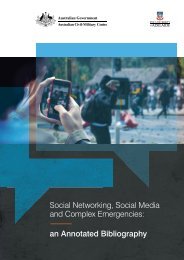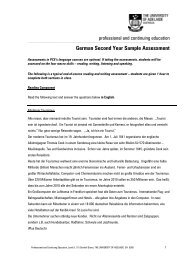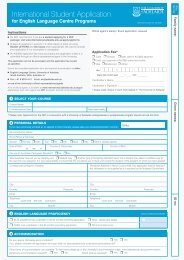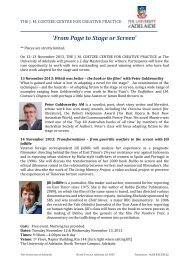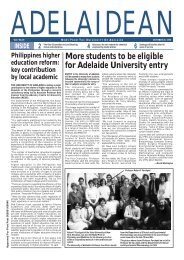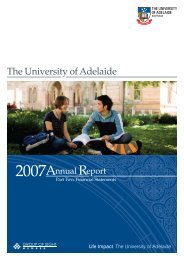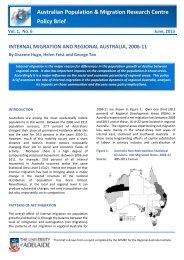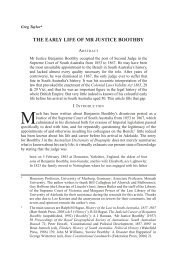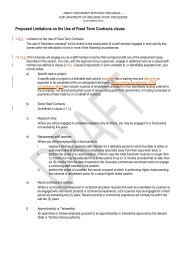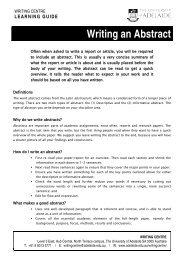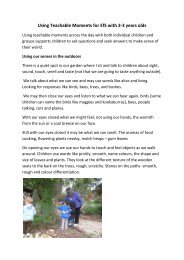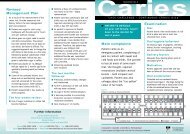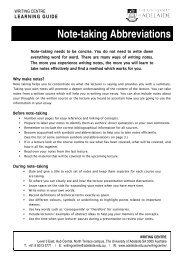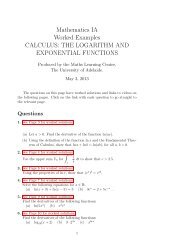Unbridling the Tongues of Women - The University of Adelaide
Unbridling the Tongues of Women - The University of Adelaide
Unbridling the Tongues of Women - The University of Adelaide
You also want an ePaper? Increase the reach of your titles
YUMPU automatically turns print PDFs into web optimized ePapers that Google loves.
<strong>Unbridling</strong> <strong>the</strong> tongues <strong>of</strong> women<br />
tomed to innovation; a family <strong>of</strong> capable and independent-minded women. Spence’s<br />
grandfa<strong>the</strong>r’s holdings were drastically reduced when he invested in an unsuccessful<br />
attempt to launch an East Lothian bank. When a stroke rendered him incapable <strong>of</strong><br />
running <strong>the</strong> one farm that he still held, he turned it over – not to his eldest son –<br />
but to his daughter Margaret, who managed <strong>the</strong> 800 acres pr<strong>of</strong>itably for <strong>the</strong> next 30<br />
years. 4 Spence remembered her aunt as a ‘vigorous business-like woman … riding or<br />
driving her little gig all over <strong>the</strong> farm’. 5 Ano<strong>the</strong>r aunt, Mary, took an independent<br />
stance on religion following <strong>the</strong> disruption <strong>of</strong> <strong>the</strong> Church <strong>of</strong> Scotland in 1843, and<br />
instead <strong>of</strong> remaining with <strong>the</strong> rest <strong>of</strong> <strong>the</strong> family, turned to <strong>the</strong> Free Church. 6 Helen,<br />
herself, had unusually forthright political views: during <strong>the</strong> debates on <strong>the</strong> first Reform<br />
Bill at <strong>the</strong> beginning <strong>of</strong> <strong>the</strong> 1820s, she wrote two letters to <strong>the</strong> local press,<br />
under <strong>the</strong> name ‘Grizel Plowter’, setting forth <strong>the</strong> advantages <strong>of</strong> reform. 7 But she did<br />
not think <strong>of</strong> even attempting to retain control <strong>of</strong> her own financial resources. When<br />
she married David Spence in 1815, she brought him a dowry <strong>of</strong> £1500, believing<br />
that ‘<strong>the</strong> wife’s fortune should come and go with <strong>the</strong> husband’s’. 8<br />
Spence’s fa<strong>the</strong>r, William, was <strong>the</strong> son <strong>of</strong> a former naval surgeon who retired to<br />
practise in Melrose. William Spence appears to have been a gentle, considerate man.<br />
<strong>The</strong> family preserved <strong>the</strong> story <strong>of</strong> his getting up early in <strong>the</strong> mornings to light <strong>the</strong> fire<br />
so that he could take his wife a cup <strong>of</strong> tea in bed; he would not rouse <strong>the</strong> maid, ‘he<br />
said young things wanted plenty <strong>of</strong> sleep’. It was, said Spence, ‘a wonderful thing for<br />
a man to do in those days’. His medicine ‘trusted much to Nature and not too much<br />
to drugs’, which meant that his grandson, young John Brodie Spence, passed a painful<br />
11 th birthday after having a double tooth extracted. 9 David Spence grew up wanting<br />
to be a farmer, but <strong>the</strong>re was no capital in <strong>the</strong> family to finance such a venture, so he<br />
was apprenticed at <strong>the</strong> age <strong>of</strong> 15 to <strong>the</strong> only lawyer in Melrose. He served a three-year<br />
apprenticeship – ‘five years was required for Writers to <strong>the</strong> Signet but inferior court<br />
practice only required three’ – which qualified him to work in a field developing as<br />
a specialism <strong>of</strong> solicitors and attorneys. 10 At <strong>the</strong> age <strong>of</strong> 18 he moved to Edinburgh<br />
with a friend, earning his living by writing law papers at threepence a page. <strong>The</strong>re,<br />
he probably spent much <strong>of</strong> his time with o<strong>the</strong>r members <strong>of</strong> <strong>the</strong> legal fraternity who<br />
became <strong>the</strong> most vociferous champions <strong>of</strong> <strong>the</strong> Whigs and reform. When he set up<br />
as a writer on his own account back in Melrose, he was a declared a ‘reformer’. 11 He,<br />
too, had come from a household <strong>of</strong> self-sufficient women: one <strong>of</strong> his sisters, Mary,<br />
established a boarding-school, at which Spence’s two elder sisters were educated. 12<br />
However, Spence’s parents were reformers, not radicals. <strong>The</strong>y may have been eager to<br />
24



